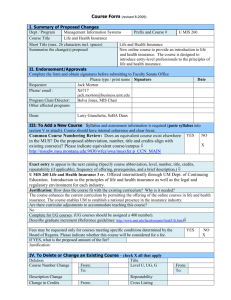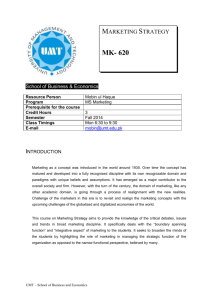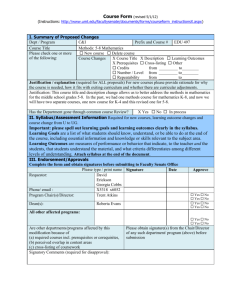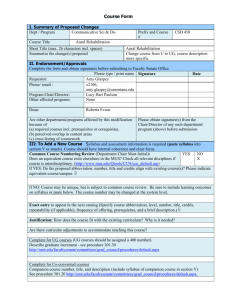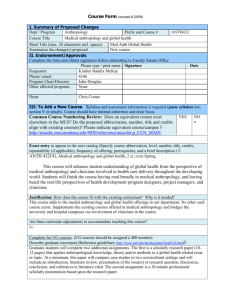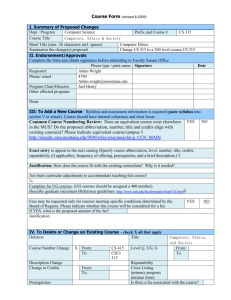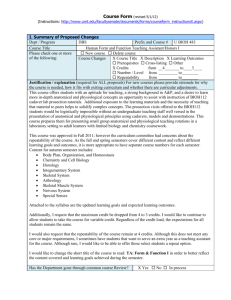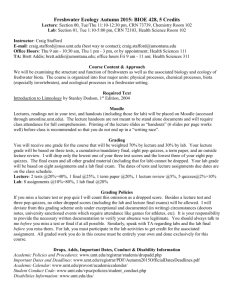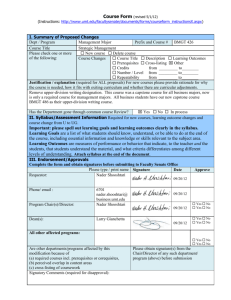IV. To Delete or Change an Existing Course – check X all that apply
advertisement
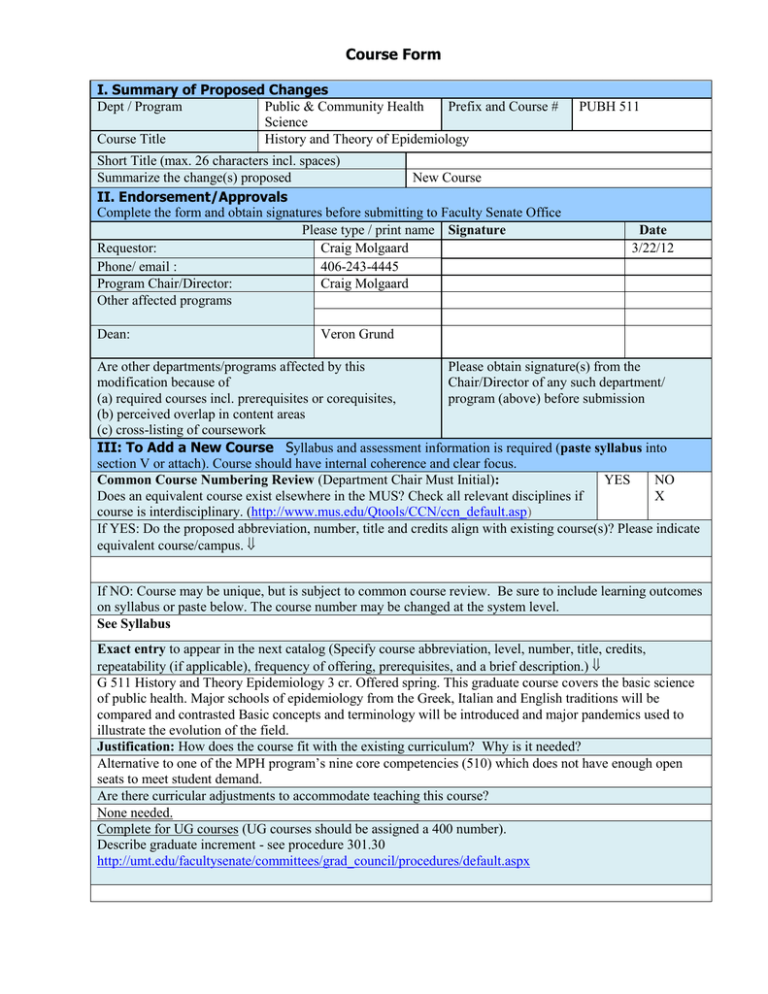
Course Form I. Summary of Proposed Changes Dept / Program Public & Community Health Prefix and Course # Science Course Title History and Theory of Epidemiology Short Title (max. 26 characters incl. spaces) Summarize the change(s) proposed New Course II. Endorsement/Approvals Complete the form and obtain signatures before submitting to Faculty Senate Office Please type / print name Signature Requestor: Craig Molgaard Phone/ email : 406-243-4445 Program Chair/Director: Craig Molgaard Other affected programs Dean: PUBH 511 Date 3/22/12 Veron Grund Are other departments/programs affected by this Please obtain signature(s) from the modification because of Chair/Director of any such department/ (a) required courses incl. prerequisites or corequisites, program (above) before submission (b) perceived overlap in content areas (c) cross-listing of coursework III: To Add a New Course Syllabus and assessment information is required (paste syllabus into section V or attach). Course should have internal coherence and clear focus. Common Course Numbering Review (Department Chair Must Initial): YES NO Does an equivalent course exist elsewhere in the MUS? Check all relevant disciplines if X course is interdisciplinary. (http://www.mus.edu/Qtools/CCN/ccn_default.asp) If YES: Do the proposed abbreviation, number, title and credits align with existing course(s)? Please indicate equivalent course/campus. If NO: Course may be unique, but is subject to common course review. Be sure to include learning outcomes on syllabus or paste below. The course number may be changed at the system level. See Syllabus Exact entry to appear in the next catalog (Specify course abbreviation, level, number, title, credits, repeatability (if applicable), frequency of offering, prerequisites, and a brief description.) G 511 History and Theory Epidemiology 3 cr. Offered spring. This graduate course covers the basic science of public health. Major schools of epidemiology from the Greek, Italian and English traditions will be compared and contrasted Basic concepts and terminology will be introduced and major pandemics used to illustrate the evolution of the field. Justification: How does the course fit with the existing curriculum? Why is it needed? Alternative to one of the MPH program’s nine core competencies (510) which does not have enough open seats to meet student demand. Are there curricular adjustments to accommodate teaching this course? None needed. Complete for UG courses (UG courses should be assigned a 400 number). Describe graduate increment - see procedure 301.30 http://umt.edu/facultysenate/committees/grad_council/procedures/default.aspx Complete for Co-convented courses Companion course number, title, and description (include syllabus of companion course in section V) See procedure 301.20 http://umt.edu/facultysenate/committees/grad_council/procedures/default.aspx. New fees and changes to existing fees are only approved once each biennium by the Board of Regents. The coordination of fee submission is administered by Administration and Finance. Fees may be requested only for courses meeting specific conditions according to Policy 940.12.1 http://mus.edu/borpol/bor900/940-121.pdf . Please indicate whether this course will be considered for a fee. If YES, what is the proposed amount of the fee? Justification: IV. To Delete or Change an Existing Course – check X all that apply Deletion Title Course Number Change From: Level U, UG, G Co-convened To: Description Change Change in Credits From: To: Prerequisites 1. Current course information at it appears in catalog (http://www.umt.edu/catalog) YES NO X From: To: Repeatability Cross Listing (primary program initiates form) Is there a fee associated with the course? 2. Full and exact entry (as proposed) 3. If cross-listed course: secondary program & course number 4. If co-convened course: companion course number, title, and description (include syllabus of companion course in section V) See procedure 301.20 http://umt.edu/facultysenate/committees/grad_council/procedures/default.aspx. 5. Is this a course with MUS Common Course Numbering? http://www.mus.edu/Qtools/CCN/ccn_default.asp If yes, please explain below whether this change will eliminate the course’s common course status. YES NO 6. Graduate increment if level of course is changed to UG. Have you reviewed the graduate Reference procedure 301.30: increment guidelines? Please check (X) space provided. http://umt.edu/facultysenate/committees/ grad_council/procedures/default.aspx (syllabus required in section V) 7. Other programs affected by the change 8. Justification for proposed change V. Syllabus/Assessment Information (must include learning outcomes) Required for new courses and course change from U to UG. Paste syllabus in field below or attach and send digital copy with form. VI Department Summary (Required if several forms are submitted) In a separate document list course number, title, and proposed change for all proposals. VII Copies and Electronic Submission. After approval, submit original, one copy, summary of proposals and electronic file to the Faculty Senate Office, UH 221, camie.foos@mso.umt.edu. Revised 8-23-11 PUBH 511-History and Theory of Epidemiology Instructor: Craig A. Molgaard, Ph.D., M.P.H. Professor and Chair School of Public and Community Health Sciences College of Health Professions and Biomedical Sciences The University of Montana Contact Information: Skaggs Building 302 406-243-4445 craig.molgaard@mso.umt.edu Format: Online with Moodle. Course procedures and expectations are those normally used in the online MPH program at the University of Montana. If questions arise contact Julie Stevens, julie.stevens@umontana.edu, or Tracy Jones at tracy.jones@mso.umt.edu or (406)243-2571. For purposes of assignments and class activities, the week starts on Monday 12:01 a.m. and ends on Sunday at Midnight. Office hours will be established the first week of the semester, during which time Dr. Molgaard will be available for phone calls or immediate email responses. Outside office hours, he will respond to emailed questions within 48 hours unless prior notice has been given to the class. Moodle Help: UMOnline has mad available an interactive tutorial for using Moodle as a student. UMOnline 101 can be found at: https://umonline.mrooms3.net/course/view.php?id=41. Additional Moodle resources can be found at: http://umonline.umt.edu/Moodle%20Tip%20Sheets/tipsheetandvideosstudents.aspx. Required Texts: 1. Cipolla, Carlo. (1992) Miasmas and Disease – Public Health and the Environment in the Pre-Industrial Age. Yale University Press. New Haven. 2. Cipolla, Carlo. (1979) Faith, Reason, and the Plague: A Tuscan Story of the Seventeenth Century. Harvestor Press, Brighton, Great Britain. 3. Cipolla, Carlo. (1993) Before the Industrial Revolution: European Society and Economy 1000-1700. W.W. Norton & Company. New York. 4. Johnson, Steven. (2006)The Ghost Map: The Story of London's Most Terrifying Epidemic--and How It Changed Science, Cities, and the Modern World. Riverhead Books. New York. Other readings as assigned will be available on electronic course reserve through Mansfield Library. Course Description: This course covers the development and evolution of epidemiology, the basic science of public health. Major schools of epidemiology from the Roman-Greek, Italian and English traditions will be compared and contrasted. Learning Objectives: Identify the health status of populations and their related determinants of health and disease. Describe the characteristics of a population- based problem. Use variables that measure public health conditions. Use methods and instruments for collecting valid and reliable quantitative and qualitative data. Identify sources of public health data and information. Recognize the integrity and comparability of data. Identify gaps in data sources. Adhere to ethical principles in the collection, maintenance, use and dissemination of data and information. Describe the public health application of quantitative and qualitative data. Collect quantitative and qualitative community data. Describe how data are used to address scientific, political, ethical and social public health issues. Gather information relevant to specific public health policy issues. Describe the scientific foundations of the field of public health. Identify prominent events in the history of the public health profession. Identify the basic public health science (including, but not limited to biostatistics, epidemiology, environmental health sciences, health services administration, and social and behavioral health sciences). Describe how the scientific evidence relates to a public health issue, concern, or intervention. Describe the laws, regulations, policies and procedures for the ethical conduct of research. Online Format: Readings from the textbooks and discussion questions from the texts and the instructor will form the basis of weekly class postings on the online discussion board. There will also be two exams given throughout the semester, one at midterm and one near the end of the semester. The course will conclude with a final term paper. Course Evaluation: Weekly postings to the discussion board will make-up class participation which constitutes 40 percent of the course grade. Each exam will be worth 15 percent of the final grade and the final term paper will constitute 30 percent of the overall grade. Final Term Paper: For the final paper, students will choose one of the following topics and discuss the important epidemiological concepts that were displayed during that event or within that theory. Additional instructions will be given later on in the semester. Topics 1. 2. 3. 4. 5. 6. Egyptian Epidemiological Tradition Epidemiology of Influenza The Manchurian Plague Small Pox during the Revolutionary War Roman Malaria Plague Yellow Fever in the U.S. Course Schedule: I. The Roman-Greek Tradition and Theory: Weeks 1-2 Readings and Concepts: To access the e-reserve materials, go to: http://eres.lib.umt.edu/eres/default.aspx Click on Course Reserves. You can either search by department, Public Health, or instructor, Molgaard. Click on PUBH 595. 51. The password is “PUBH 595”Click on the Readings folder and download the readings for the week. Week 1 Saracci. Introducing the History of Epidemiology. (E-reserve material) Hippocrates. On Airs, Water and Places. (E-reserve material) Homer. The Iliad. Book 1: Verses 10-68. (E-reserve material) Week 2 Galen. On Food and Diet. Chapters 2 and 5 (Electronic Book available through the Mansfield Library) To connect to this title, make sure you are logged on so that you can access university services. (http://onestop.umt.edu) Go to http://www.lib.umt.edu/ and search for “On Food and Diet”. Click on “Galen, on food and diet [electronic resource] / Mark Grant.” Click “Connect to this title online”. Little, Lester. Plague and the End of Antiquity. (E-reserve material) i. Chapter 1: Life and Afterlife of the First Plague Pandemic. Pgs. 3-32 Chin. Control of Communicable Diseases Manual. Section on Plague. Pgs. 381387.(E-reserve material) II. The Early Christian Tradition and Theory: Weeks 3-5 Readings and Concepts: McCormick, Michael. Origins of the European Economy: Communications and Commerce AD 300-900. Chapters 1, 3, and 4. (E-reserve material) Week 3 Chapter 1: The End of the Ancient World i. Long-Term Trends in the Late Roman Economy ii. People and Food iii. Population Health Week 4 Chapter 3: Land River Communications in Late Antiquity i. Routes, Ships, Men ii. Land Communications and the closing of the overland corridors iii. River Communications and the case of the Rhone route Week 5 Chapter 4: Sea Change in Late Antiquity i. Transport and Commerce ii. Public money and private ships iii. Ports, ships, and cargoes iv. Secular change 1: the flow of goods v. Secular change 2: the transformation of late Roman shipping III. The Italian Tradition and Theory: Weeks 6-10, Midterm, Week 8 Readings and Concepts: Cipolla. Before The Industrial Revolution. Week 6 Part I: A static approximation 1. Demand 2. The Factors of Production 3. Productivity and Production Week 7 Part II: Toward a dynamic description 4. The Urban Revolution: The Communes 5. Population: Trends and Plagues 6. Technology 7. Enterprise, Credit, and Money 8. Production, Incomes, and Consumption 9. The Emergence of the Modern Age 10. The Changing Balance of Economic Power in Europe Week 8 Cipolla. Miasmas and Disease. 1. The Health Boards in Italy and Epidemiological Concepts 2. ‘Miasmas, Filth, and Rubbish’ 3. Medical Reports and the Florentine’s Health Magistrates 4. Doctors, Diseases, and People 5. Conclusion Week 9 Cipolla. Fighting the Plague in Seventeenth Century Italy. (E-reserve material) Chapter 1: Theory, Observation, and Policy Week 10 Cipolla. Faith, Reason, and the Plague. Week 11: SPRING BREAK IV. The English Tradition and Theory: Weeks 12-15 Readings and Concepts: Johnson. The Ghost Map. Week 12 1. The Night-Soil Men 2. Eyes Sunk, Lips Dark Blue 3. The Investigator 4. That is to Say, Jo Has Not Yet Died 5. All Smell is Disease Week 13 6. Building the Case 7. The Pump Handle 8. The Ghost Map 9. Broad Street Revisited Week 14 Rosenberg, Charles. The Cholera Years: The United States in 1832, 1849, and 1866. (E-reserve material) Week 15 Howard-Jones. The Scientific Background of the International Sanitary Conferences 1851-1938. (Ereserve material) V. Summary, Conclusions, Final Exam: Week 16 Plagiarism: All students must practice academic honesty. Academic misconduct is subject to an academic penalty by the course instructor and/or a disciplinary sanction by the University. All students need to be familiar with the Student Conduct Code. The Code is available for review online at http://life.umt.edu/vpsa/documents/StudentConductCode1.pdf. Plagiarism is the representing of another's work as one's own. It is a particularly intolerable offense in the academic community and is strictly forbidden. Students who plagiarize may fail the course and may be remanded to Academic Court for possible suspension or expulsion. (See UM Student Conduct Code). Students must always be very careful to acknowledge any kind of borrowing that is included in their work. This means not only borrowed wording but also ideas. Acknowledgment of whatever is not one's own original work is the proper and honest use of sources. Failure to acknowledge whatever is not one's own original work is plagiarism. (Source: http://libguides.lib.umt.edu/plagiarism) Accommodation: In accordance with University of Montana’s mission to provide equal educational opportunities for all students, necessary accommodations for students with disabilities will be made whenever possible. If you require accommodations, please provide written information regarding your disability from the Disability Services as soon as possible so that accommodations can be made.
